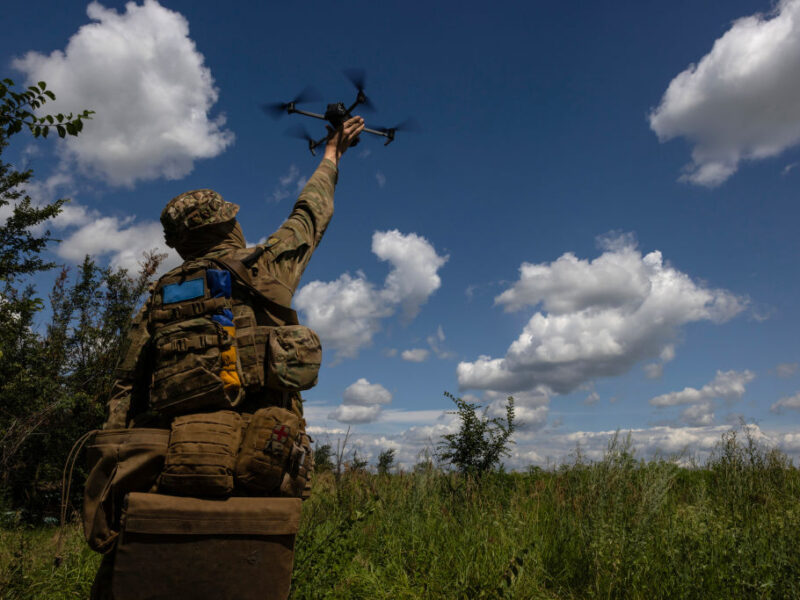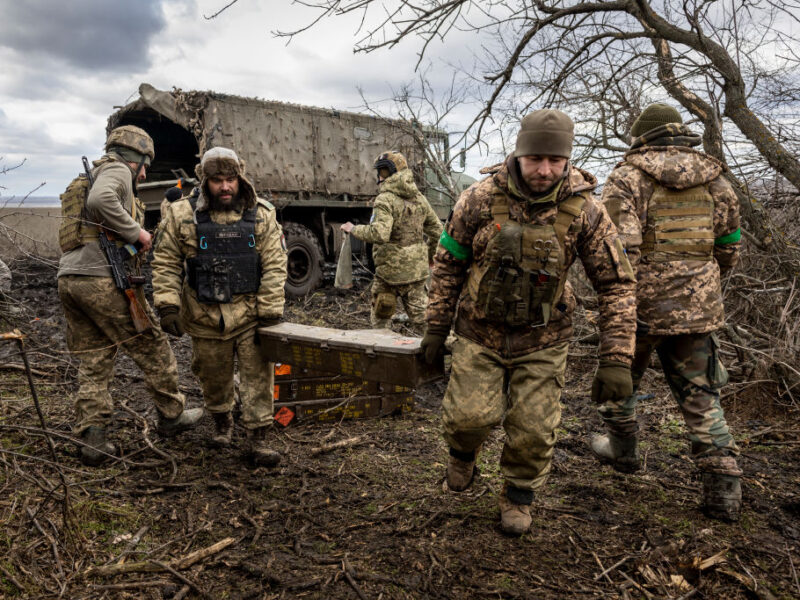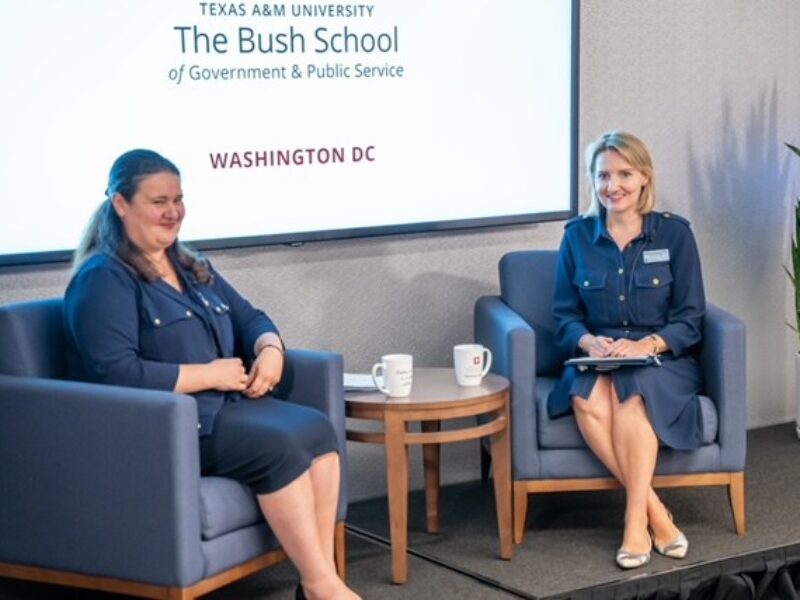Ukrainian Aggies Watch Russian Invasion From Afar: ‘It’s Just Hard To Realize’
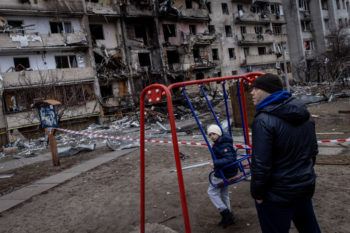
The sun is going down in Kyiv when Olga, a chemistry graduate student, starts her days by calling her parents living in the center of a war zone.
They tell her they’ve been turning out the lights in their apartment building in Ukraine’s capital to avoid drawing attention during the near-constant Russian bombardments. In one recent text, her mother shared a photo of the pillows and blankets they’ve dragged into the hallway where they sleep, far from any windows, in case of nearby explosions.
Between waiting for these updates from her mother and father, Olga spends any free time refreshing her social media feeds and watching news coverage of the Russian invasion. Similarly, Alex, a graduate student in the College of Engineering, waits each day for word from her parents that they’re safe in a nearby village outside Kyiv.
“It is quiet where they are, but over the night they can see fires from large distances and saw something flying in the sky,” Alex said. “To some extent it’s still hard to fully understand that this is happening.”
Alex and Olga – both asked to be identified by their first names to protect their families – are among nine students from Ukraine enrolled at Texas A&M University this semester. Their families have so far remained safe, but the students say they fear for their loved ones as they anxiously watch the war unfold. Both say the images of missile explosions, residential buildings destroyed by shelling, and civilians fleeing the city are shocking to see in a post-Cold War era Ukraine.
The invasion of her hometown, once unimaginable, has been difficult to process, Alex said.
“It’s hard to see the city you’ve spent more than 20 years in that was always peaceful and beautiful, never involved in any war actions for most of its independence, and then suddenly a full-scale war happens,” she said. “It’s just hard to realize all this.”
Even as Russian troops continued to build up near the border, she said, “no one wanted to believe” President Vladimir V. Putin would actually order the invasion. People of her parents’ generation, Alex said, have lived “regular, peaceful” lives, knowing nothing of war. “And now it’s just hell that’s going on,” she said.
After grabbing important documents, food, money and other useful belongings, Alex’s parents left their high-rise building in Kyiv to stay with her grandmother outside the city. The house has a detached underground cellar, typically used to store potatoes, homemade pickles and other food, that can be used as a bomb shelter, if need be. So far this hasn’t been necessary, she said, but even in the suburbs her parents still see what they assume are the streaking lights of missiles in the night sky as the city is attacked.
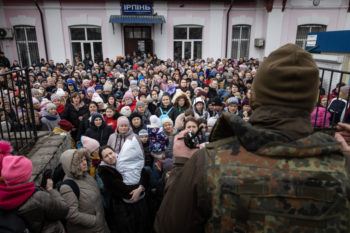
Meanwhile, Olga’s parents in Kyiv regularly hear gunfire outside their building and catch glimpses of rockets from their windows. Their district is under constant bombardment, she said, but family has nowhere else to go. Her father, like all men ages 18 to 60, is legally prohibited from leaving the country.
Olga said her mother will not leave her father or her grandparents, who live nearby. So for now, they will stay at home and wait for the conflict to end.
Olga said she had expected assaults at the eastern border, but did not anticipate Kyiv, located in the central region of the country, to be targeted so quickly. The night she learned her hometown had been invaded, she could not go to sleep.
“At the beginning I was so scared. I tried to go to work, but I watched the news, checking everything,” she said.
Watching the warped version of reality being presented by Russian television networks has been particularly disturbing for Olga. “It’s full of lies,” she said, urging people to be watchful for propaganda and “think critically all the time.”
She’s talked with friends who say their family members in Russia are in denial of the existence of any war in the neighboring country. Even in College Station, Olga said, people have told her they believe the invasion was instigated by Ukraine.
Putin has said his aim is to “demilitarize and de-Nazify” Ukraine. The students expressed dismay at this and the Russian leader’s stated belief of Russians and Ukrainians as “one people.” Ukraine has its own distinct identity, culture and language, they said. And despite Putin’s claim that Russian speakers are being suppressed, they said people freely speak the language across the country.
For Putin, Alex said, the current Russia-Ukraine conflict is his latest attempt at reclaiming influence over the sovereign state. Ukraine, which has been independent for more than 30 years since the collapse of the Soviet Union, “never did anything to provoke aggression,” she said.
Ukraine toppled its pro-Russian government in 2014. In the aftermath, Russia invaded and annexed Crimea in an attempt to regain influence.
“It’s easy to use times of instability to do what you want to do, and that’s what Putin did,” Alex said. “We’ve had two democratic elections since then. And yes, Ukraine is not the most economically prosperous country, but we were starting to build that. People still critique the government. Who doesn’t? But everyone is free to express their opinion in any language. No one was suppressed.”
Nearly 150 Aggies and community members hosted a rally in support of Ukraine in Rudder Plaza today. 🇺🇦 pic.twitter.com/vYb6czUZcq
— Texas A&M University (@TAMU) March 6, 2022
At Texas A&M, the Office of the Provost expressed its support last week for those affected by the conflict in a message acknowledging that the “anxiety that any war causes is palpable, regardless of ties to the region.” And over the weekend, more than 125 people gathered on campus to protest the invasion.
Speakers at the event called for the world to stand “against the evils of Putin” and for NATO leadership to “close the skies” by establishing a no-fly zone over Ukraine.
Amid the undercurrent of unease and distress as she clicks through an endless stream of Facebook videos and Instagram stories showing Ukraine under assault, Olga said she also feels a sense of pride. The resolve of its military and bravery of civilians who have joined the resistance are emblematic Ukrainians’ will to fight, she said.
“Now I watch how our army is fighting and I’m really proud of Ukraine,” she said. “I’m more confident now that we have a strong mental spirit and moral spirit. That’s why I believe we will win this fight. But I’m still scared.”
